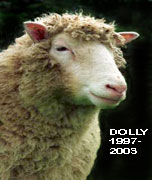
Dolly, a sheep, made headlines when she was born without a father but rather the identical copy of another adult. Ian Wilmut and his colleagues at the Roslin Institute in Edinburgh, Scotland created Dolly in 1997 after successfully replacing the nucleus of an unfertilized sheep egg with that of the nucleus of an adult sheep cell, creating a complete set of genes in the egg as if it had been fertilized by sperm. The successful egg had been one implanted into a sheep that carried it to term. Despite the fact that Dolly had to be put to sleep after contracting a lung disease in her sixth year, fear circulated that the technology would be used to clone humans, sidestepping the role of men. An ethical controversy still rages as a group of Missourians attempt to develop a new initiative to change the Missouri Constitution to further ban cloning.
To de-activate the music, click on Louie twice.
Proposed ballot language was filed with the Missouri Secretary of State's office this morning (August 22, 2007) that would re-open the human cloning issue that was the subject of a successful ballot amendment last November. Dr. Lorena "Lori" Buffa, a mother and pediatrician with the Mercy Medical Group of St. Peters, as volunteer chairperson, filed the initiative. Buffa, who got her Doctor of Medicine from the University of Missouri School of Medicine has been a licensed physician for about six years.
In a prepared statement, Dr. Cynthia Croy, a general practitioner in Joplin, made clear her support for the Cures Without Cloning (CWC) effort. She said, "I support the Cures Without Cloning initiative to prohibit the cloning of human beings, so we can focus on more promising research that is ethical,proven and will help save lives." She follows the belief that, "Human cloning is dangerous, unproven and unnecessary. It's imperative that our search for lifesaving cures and treatments advances according to ethical, moral guidelines."
Croy has joined the coalition of concerned doctors, academics and citizens that supports the attempt to clarify and strengthen some of the language Missouri voters approved in November 2006. Constitution Amendment 2 amended the Missouri Constitution to allow and set limitations on stem cell research, therapies and cures. It prohibits human cloning defined as "implanting such an embryo into a uterus with the purpose of creating a fetus or fully grown human."
According to Buffa, this language "allows for the same cloning method that created Dolly the Sheep." The initiative she supports she says "will ensure this dangerous, unproven, unnecessary practice is prohibited, and allow us to focus on safe research that leads to lifesaving cures and treatments.”
The initiative would amend the Missouri Constitution to prohibit the practice of human cloning, and would prohibit taxpayer funding of human cloning experiments. Specifically, the coalition is seeking to place the following language in the Missouri constitution:
- Section 38 (e) - It shall be unlawful to clone or attempt to clone a human being. Researchers may conduct stem cell research to discover cures for disease and develop stem cell therapies and cures, provided that the research complies with the limitations of this section and, in addition, the limitations of Section 38(d).
- For all purposes within this constitution: (1) “Clone or attempt to clone a human being” includes the creation of or the attempt to create, by means other than fertilization of a human egg with human sperm, a new human organism that is virtually identical genetically to an existing or previously existing human organism or human organisms. (2) “Human organism” means human life in any stage. Human life begins with an initial stage, when a single human egg cell receives a complete set of forty-six chromosomes, and continues through any subsequent stages of embryonic, fetal, postnatal, and later development.
- No taxpayer dollars shall be expended: (1) to clone or attempt to clone a human being; or (2) to research or experiment using a human organism, or any part of a human organism, derived from cloning or attempting to clone a human being.
Constitution Amendment 2 passed with only a 2.4% margin of votes and tallied 51.2% voting in favor and 48.8% opposed. The margin represented a little over 50,000 votes. It pitted Missourians Against Human Cloning of Chesterfield of which the new group of opponents were members against the Missouri Coalition for Lifesaving Cures of Clayton.
While members of the CWC oppose cloning on ethical grounds, opponents say that potential uses for cloning whether of whole animals or cells includes producing proteins for medical and nutritional use or the cloning of genetically modified animals like pigs to be organ donors for humans. Additionally, supporters say that "therapeutic" cloning which involves cloning embryos in order to collect cells might lead to treatments for many human degenerative conditions, such as Alzheimer's and Parkinson's diseases.
In order to have a proposition placed on the ballot to amend the constitution petitions must be signed by 8% of the legal voters in each of 2/3 of the congressional districts in the state.
After the petition language is approved CWC hopes to build strong support for their initiative including the raising of necessary resources.






Comments